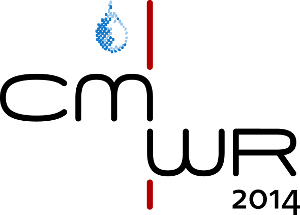Data assimilation at the Computational Methods in Water Resources Conference (CMWR) 2014 in Stuttgart
Contributed by Harrie-Jan Hendricks Franssen and Insa Neuweiler
 The Conference on Computational Methods in Water Resources is a conference bringing together scientists in water research in different fields with a focus on computational methods. The conference alternates between places in the USA and Europe and will be held from 9th to 13th of June in 2014 in Stuttgart. The number of participants is typically several hundreds.
The Conference on Computational Methods in Water Resources is a conference bringing together scientists in water research in different fields with a focus on computational methods. The conference alternates between places in the USA and Europe and will be held from 9th to 13th of June in 2014 in Stuttgart. The number of participants is typically several hundreds.
With increasing availability of high quality observations, for example from remote sensing, we believe that data assimilation will play an increasing role in water research, also in subsurface flow. Due to the interdisciplinarity of water research, we think that exchange between scientists from different disciplines developing data assimilation methods or applying them would be beneficial for the field. For this reason we initiated a session on this year’s CMWR conference in Stuttgart. We invite contributions from all fields in water research. The announcement of the conference on the internet with a link to the session can be found here. Data assimilation is one of the topics of the Scientific Implementation Plan of HEPEX.
Abstract of the session: When predicting water flow and transport problems with models, integration of observations is a key issue for model quality. In complex systems, computational efficiency might be required and it might be necessary to integrate different types of observations taken with different frequencies. There is a high demand for improved data assimilation strategies in modeling of flow and transport processes. This session focuses on sequential data assimilation methods for improved estimation of states, fluxes and possibly parameters of terrestrial hydrosystem models. Terrestrial system models can be blackbox, greybox or mechanistically based models for single compartments (e.g., groundwater) or coupled models that comprise multiple compartments (e.g., land surface and vadose zone). In general, the focus will lie on hydrological models and models that simulate coupled water flow and energy and solute transport. Presentations discussing data assimilation concepts and strategies in general are welcome to the session. We invite contributions addressing new methodological developments for data assimilation, contributions addressing assimilation of new data types with novel measurement operators, and contributions on multiscale or multivariate data assimilation. We also invite contributions showing applications in real-world case studies with verification of predictions, or case studies that highlight the challenges and the demand of future research directions. Uncertainty characterization is an important aspect in data assimilation studies and we welcome contributions for characterization/modelling of measurement uncertainty, uncertainty of forcing, model parameters and model structure.
0 comments